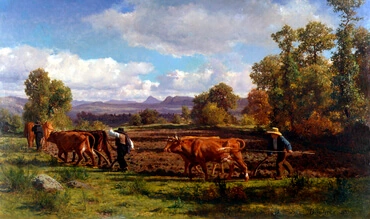Terreno

Existe alguma diferença no significado entre "terra" e "solo"? No início não parece; ambos se referem ao solo que compõe a massa terrestre do planeta que habitamos.
Mas se pensarmos bem, os significados são sombreados em diferentes direcções. Nós tendemos a usar "terra" num sentido mais geral - significando todo o solo em toda a parte ou qualquer solo em qualquer lugar. "Terra" é mais específico, referindo-se à porção de terra em que nos encontramos, ou a alguma porção de terra que pretendemos cultivar ou usar de outra forma.
E assim está na Bíblia. "Terra" refere-se ao exterior de uma pessoa ou de uma comunidade - seus pensamentos e ações cotidianas - em um sentido amplo e geral. "Terra" refere-se às partes de nossas vidas externas que estão prontas para o cultivo, prontas para serem postas em uso.
O cultivo, claro, envolve afrouxar o solo (quebrando nossos hábitos e pensamentos distrativos) e plantar sementes (verdadeiros conceitos e idéias que brotam de um desejo de ser bom). À medida que essas sementes começam a crescer, nós começamos a ser verdadeiramente úteis.
Em resumo, então, "terra" na Bíblia pode significar uma pessoa ou comunidade que é receptiva aos ensinamentos do Senhor. Pode também significar uma pessoa ou igreja que tenha recebido o ensinamento do Senhor e o esteja pondo em uso.
(Odkazy: Arcanos Celestes 94, 268, 345, 377, 566, 1068, 2327, 6135 [1-2], 6154)
Arcana Coelestia # 2327
2327. 'And bowed down with his face towards the ground' means humiliation. This becomes clear without explanation. The reason why in the past, especially in the representative Churches, people would bow so far down that their faces touched the ground, was that 'the face' meant man's interiors, 358, 1999. And they did so down 'to the ground' because 'the dust of the ground' meant that which is profane and condemned, 278. In doing this they represented the fact that of themselves they were profane and condemned. They therefore prostrated themselves face downwards on the ground, indeed they wallowed in dust and ashes, and also cast dust or ashes over their heads, as becomes clear from Lamentations 2:10; Ezekiel 27:30; Micah 1:10; Joshua 7:6; Revelation 18:19; and elsewhere.
[2] By these actions they represented a state of true humility, which can in no way exist unless people acknowledge that of themselves they are profane and condemned, and so of themselves are incapable of looking towards the Lord where everything is Divine and Holy. To the extent therefore that a person acknowledges his own condition he can possess true humility, and when engaged in worship can have real devotion. For all worship must contain humility, and if separated from it no adoration and so no worship at all is present.
[3] The reason a state of humility is vital to worship itself is that insofar as the heart is humbled self-love and all resulting evil come to an end; and insofar as these come to an end good and truth, that is, charity and faith, flow in from the Lord. For what above all else stands in the way of their being received is self-love. Indeed within self-love there lies contempt for all others in comparison with oneself; there lies hatred and revenge if one is not venerated most highly; and there lies mercilessness and cruelty within it, and thus the worst evils of all into which good and truth cannot possibly be introduced, since they are completely opposite.






